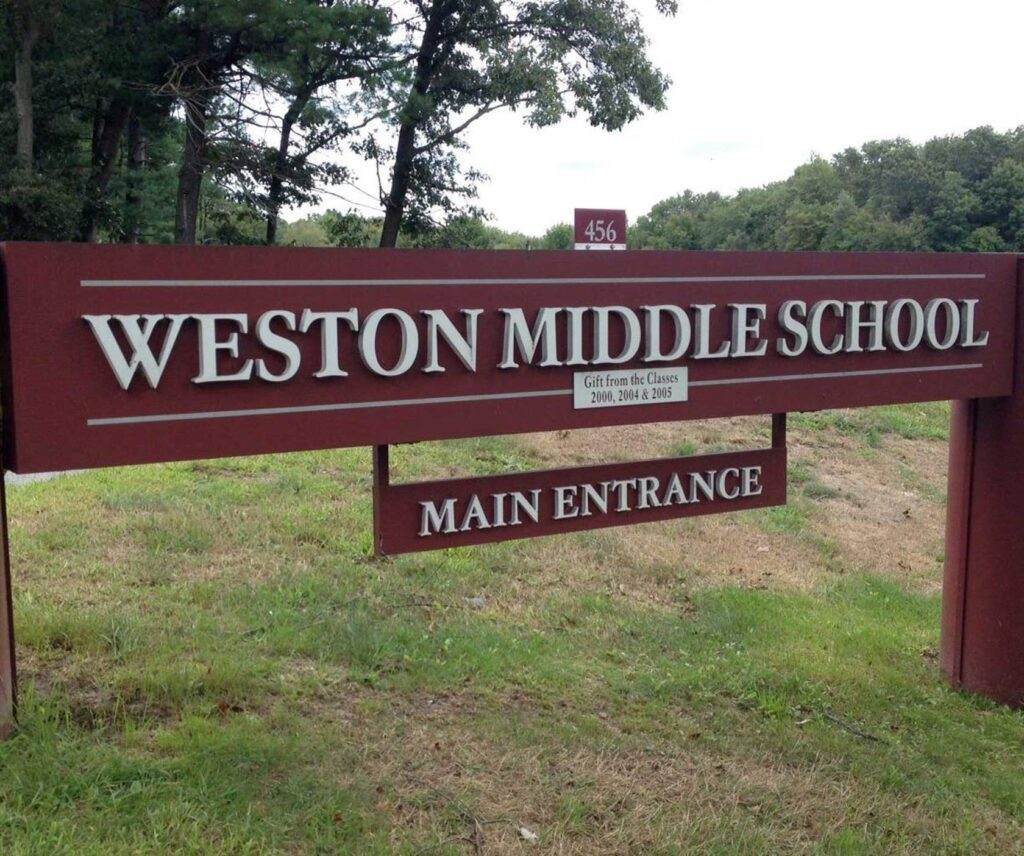
A cultural misunderstanding of rap slang appears to be behind a decision by Weston Middle School to impose a “safety plan,” the equivalent of a restraining order, on a Metco student that required him to stay away from and not talk to a white classmate who has been a longtime friend. The restrictions extended to online contact.
The Metco student, a Black boy in the eighth grade, in February composed and recorded a rap song with a friend. The song speaks of “nina.” Since the 1990s, rappers have used the word as a modified form of nine, meaning a nine-millimeter handgun. But it is also the first name of his classmate, leading the principal to respond as if the lyrics represented a threat to the white girl.
Two days after the song was posted online, the Metco student and his parents were summoned to the office of Principal Phil Oates, who imposed a one-day, in-school suspension and an open-ended safety plan on the boy, according to his mother, Nadine Marcellus of Mattapan, and her lawyer, Jack Drewry, who is also a contributing writer to the Banner.
The plan, described as “designed to keep everyone safe,” lists nine restrictions on the Metco student’s activity and calls his classmate “the victim.” The prohibitions include not speaking to her “under any circumstances” and not sitting at the same lunch table or “glaring or making any gestures towards” her.
He was asked to “remove himself from any group chat containing the victim on all text messaging and social media outlets.” The two students had been active participants, with other classmates, in a chat room, and all of them had often gone to the mall and birthday parties together.
Under other provisions of the plan, the boy was removed from the same homeroom as the girl and required to travel on a separate bus on field trips. On one field trip, the boy was already seated on a bus but was ordered to get off when his classmate boarded, according to Drewry.
Marcellus compared the safety plan to a court-issued restraining order and denounced it as the “Emmett Till safety plan 2024,” a reference to the 14-year-old Black boy killed in Mississippi in 1955 for allegedly whistling at a white woman.
“You can’t be around that white girl — you’ll be in trouble. You can’t look at that white girl — you’ll be in trouble,” said Marcellus, a former principal of the Winship School in Allston.
The disciplinary action, she said, has caused her son to lose his excitement about going to school.
“He said, ‘Mom, what did I do so wrong?’” Marcellus said. “He’s walking at school on pins and needles … My son used to love going to school.”
Representatives of Weston schools and Metco declined to comment.
“I can’t talk to you about any disciplinary situation at our school,” Oates, the principal, said. He hung up before a Banner reporter could ask him to spell out the school’s standards for imposing a safety plan. The school located west of Boston is 54% white, 23% Asian, 9% Hispanic and 6% Black, according to state data.
Federal privacy law prohibits schools from disclosing details of student disciplinary action. The Banner is not identifying either student because they are minors.
Paige Tobin, a Braintree lawyer who has represented Weston schools in the matter, did not return phone calls. Theresa Dryden, the Metco coordinator in Weston, said she couldn’t comment without clearance from higher school administrators because the case is ongoing.
The rap song at issue, which runs about a minute and a half, liberally samples other tunes and, like many songs of the genre, is sprinkled with the f-word and b-word.
Early in the song, there is a profane reference to “Nina” as a “she.” Marcellus and Drewry said those words were added to the finished song — to fulfill a request his classmate made in the shared chat room to be included in the song. Those lyrics sound like they were dubbed in because they were not faded in and out to make smooth transitions, a technique professionals use.
Later in the song there is a line about “clutching a nina,” which Marcellus said her son said was intended to mean a gun.
Before this incident, Marcellus said: “I didn’t realize songs have ninas in them. More than a hundred songs have ninas in them.”
A Weston police officer assigned to the middle school contacted her. “He said that’s a song they sing in the hallways,” Marcellus recalled. “The police didn’t see anything wrong with it.”
Like many Black boys and young men, her son is drawn to the allure of rap music.
“My son is always rapping. He’s a budding rapper,” Marcellus said. “This is a normal teenage activity, creating a song and sharing it.”
Marcellus, who spent 10 years in the Boston Public Schools before becoming disabled with multiple sclerosis, which has left her in a wheelchair, called the Weston school’s investigation flawed because it did not bring together the two students and the others who posted in the chat room. She also said she would have taken a restorative justice approach.
A picture taken on eclipse day, April 8, shows the white girl standing in front of Marcellus’ son with her back turned to the camera, Drewry said, calling it evidence the girl was not fearful of her classmate. The photo was posted on the Facebook page of Weston Middle School.
On May 14, Marcellus, Drewry, Principal Oates and Tobin, the school’s outside lawyer, attended a meeting to discuss the disciplinary action. Marcellus requested that the school remove the cyberbullying charge from her son’s record and rescind the safety plan.
Two weeks later, about 90 days after the safety plan was imposed, the school softened but did not eliminate the restrictions on her son in a “revised student support plan.” It described his infraction as “harassment” that “targeted” his classmate. Its stated goals were to “minimize contact and avoid any negative reactions” between the two students.
Marcellus said she was disappointed and disagreed with the plan, which she had not seen in draft form.
“It’s not ‘cyberbullying.’ Now, it’s ‘harassment,’” she said. “He never cyberbullied her. He never harassed her.”







